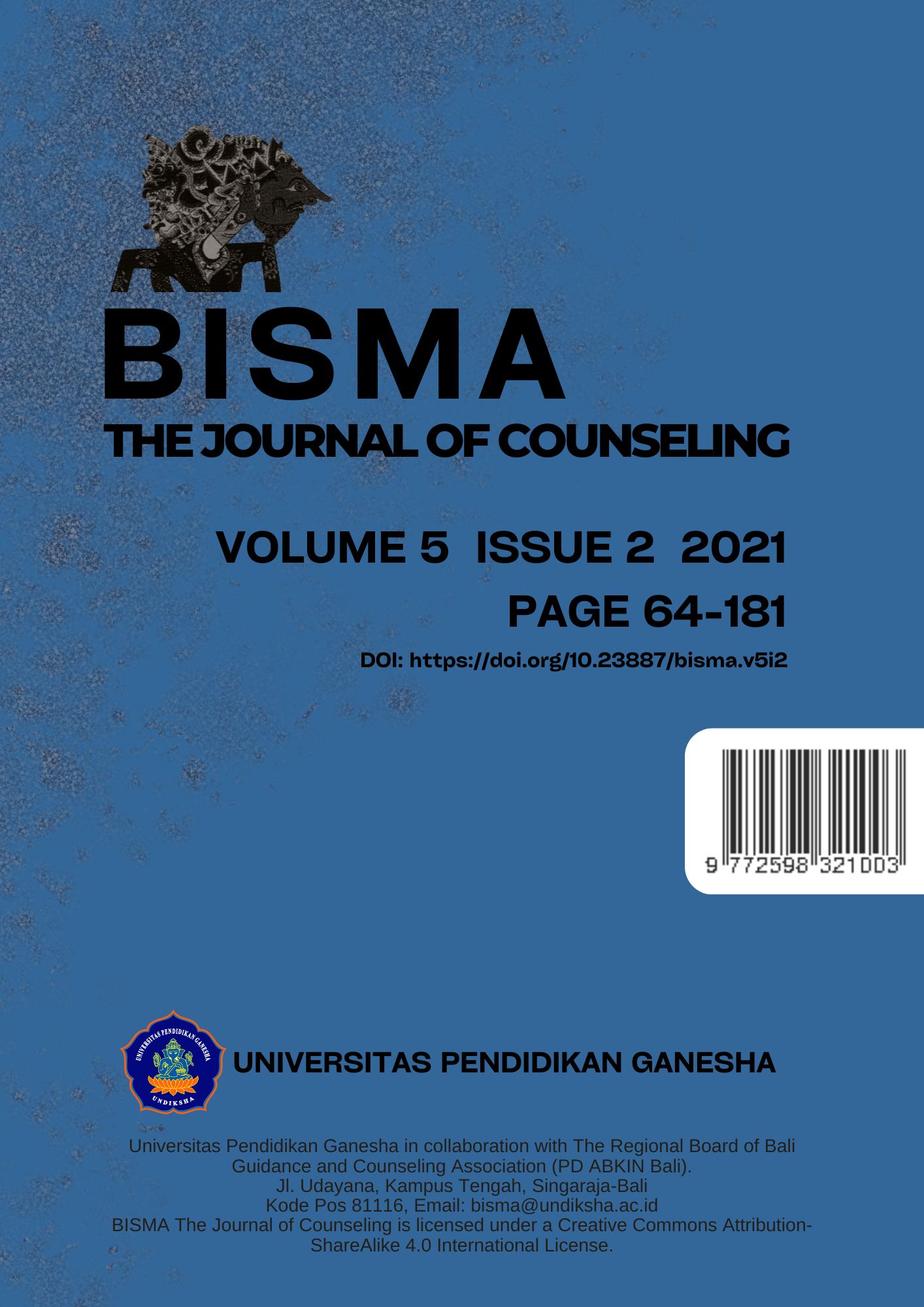Generation Z Career Identity Formation Through Guidance and Counselling Services
DOI:
https://doi.org/10.23887/bisma.v5i2.35401Keywords:
career identity, generation Z, guidance and counselling servicesAbstract
This study aims to describe a generation Z career identity formation through guidance and counselling services. This research used a qualitative approach with the phenomenology method. The research subjects are late adult adolescents (18-25 years) with two people. The selection of informants based on their late teens tended to require counselling and guidance services and began to consider future careers. Data collection methods used were in-depth interviews and observation. These research results are forming career identity, determining interests, having confidence in the career to be pursued, and ownership of figures to explore the chosen career field. Generation Z career identity includes the embodiment of self-concept for the chosen job. The digitalization era also influences generation Z's career identity formation. Therefore, the role of guidance and counselling services is crucial in helping individual planning and specialization.References
Andrea, B., Gabriella, H., & Timea, J. (2016). Y Dan Z Generations At Workplaces. Journal Of Competitiveness., 8(3).
Arjanggi, R. (2017). Identifikasi Permasalahan Pengambilan Keputusan Karir Remaja. Psikologika: Jurnal Pemikiran Dan Penelitian Psikologi, 22(2), 28–35. Https://Doi.Org/10.20885/Psikologika.Vol22.Iss2.Art3
Barhate, B., & Dirani, K. M. (2021). Career Aspirations Of Generation Z: A Systematic Literature Review. European Journal Of Training And Development, Ahead-Of-Print(Ahead-Of-Print). Https://Doi.Org/10.1108/EJTD-07-2020-0124
Barnett, R. V. (2019). Helping Teens Answer The Question “Who Am I?”: Cognitive Development In Adolescents. 2005(15), 3.
Bencsik, A., Juhász, T., & Horváth-Csikós, G. (2016). Y And Z Generations At Workplaces. Journal Of Competitiveness, 6(3), 90–106. Https://Doi.Org/10.7441/Joc.2016.03.06
Berkowitz, M. W., & Bier, M. C. (2004). Research-Based Character Education. The ANNALS Of The American Academy Of Political And Social Science, 591(1), 72–85. Https://Doi.Org/10.1177/0002716203260082
Betz, N. E., Klein, K. L., & Taylor, K. M. (1996). Evaluation Of A Short Form Of The Career Decision-Making Self-Efficacy Scale. Journal Of Career Assessment, 4(1), 47–57. Https://Doi.Org/10.1177/106907279600400103
Falk, R., & Kim, S. S. (2019). The War System: An Interdisciplinary Approach. Routledge.
Gainor, K. A. (2006). Twenty-Five Years Of Self-Efficacy In Career Assessment And Practice. Journal Of Career Assessment, 14(1), 161–178. Https://Doi.Org/10.1177/1069072705282435
Hamilton, V. E., & Marcinkus, M. W. (2011). Married Professional Women’s Career Exit: Integrating Identity And Social Networks. Gender In Management: An International Journal, 26(1), 57–83. Https://Doi.Org/10.1108/17542411111109318
Hanurawan, F. (2012). Metode Penelitian Kualitatif Dalam Ilmu Psikologi. Surabya: KPKM Universitas Airlangga.
Hidayat, D. R., & Prabowo, A. S. (2019, April). A Career Development Program For Higher Education In Indonesia; The Strategy To Achieve Career Maturity. 125–129. Atlantis Press. Https://Doi.Org/10.2991/Icamr-18.2019.32
Kraus, M. W., Chen, S., & Keltner, D. (2011). The Power To Be Me: Power Elevates Self-Concept Consistency And Authenticity. Journal Of Experimental Social Psychology, 47(5), 974–980. Https://Doi.Org/10.1016/J.Jesp.2011.03.017
Lane, J., Lane, A. M., & Kyprianou, A. (2004). Self-Efficacy, Self-Esteem And Their Impact On Academic Performance. Social Behavior And Personality: An International Journal, 32(3), 247–256. Https://Doi.Org/10.2224/Sbp.2004.32.3.247
Mansyur, A. I., Chairunnisa, D., & Hidayat, D. R. (2020). Implementasi Teori Super Pada Program Layanan Bimbingan Dan Konseling Karir Untuk Mahasiswa Perguruan Tinggi. Psikologi Konseling, 15(2). Https://Doi.Org/10.24114/Konseling.V15i2.16197
Marcia, J. E. (1993). The Ego Identity Status Approach To Ego Identity. In J. E. Marcia, A. S. Waterman, D. R. Matteson, S. L. Archer, & J. L. Orlofsky (Eds.), Ego Identity: A Handbook For Psychosocial Research (Pp. 3–21). New York, NY: Springer. Https://Doi.Org/10.1007/978-1-4613-8330-7_1
Meijers, F., & Lengelle, R. (2012). Narratives At Work: The Development Of Career Identity. British Journal Of Guidance & Counselling, 40(2), 157–176. Https://Doi.Org/10.1080/03069885.2012.665159
Moleong, J. L. (2011). Metodologi Penelitian Kualitatif. Bandung: P. Remaja Rosdakarya.
Nazar, G., & Heijden, B. I. J. M. Van Der. (2012). Career Identity And Its Impact Upon Self-Perceived Employability Among Chilean Male Middle-Aged Managers. Human Resource Development International, 15(2), 141–156. Https://Doi.Org/10.1080/13678868.2012.664692
News Northeastern. (2014). ‘Generation Z’ Is Entrepreneurial, Wants To Chart Its Own Future. Retrieved June 4, 2021, From Https://News.Northeastern.Edu/2014/11/18/Generation-Z-Survey/
Nurfadhilla, N. (2020). Upaya Meningkatkan Efikasi Diri Melalui Layanan Bimbingan Konseling. ENLIGHTEN: Jurnal Bimbingan Konseling Islam, 3(1), 48–59. Https://Doi.Org/10.32505/Enlighten.V3i1.1495
Porfeli, E. J., Lee, B., Vondracek, F. W., & Weigold, I. K. (2011). A Multi-Dimensional Measure Of Vocational Identity Status. Journal Of Adolescence, 34(5), 853–871. Https://Doi.Org/10.1016/J.Adolescence.2011.02.001
Roman, L. A. (2014). Using Social Media To Enhance Career Development Opportunities For Health Promotion Professionals. Health Promotion Practice, 15(4), 471–475. Https://Doi.Org/10.1177/1524839914535213
Santoso, D. B. (2013). Dasar-Dasar Bimbingan Dan Konseling. Malang: Universitas Negeri Malang.
Sonnert, G. (2009). Parents Who Influence Their Children To Become Scientists: Effects Of Gender And Parental Education. Social Studies Of Science, 39(6), 927–941. Https://Doi.Org/10.1177/0306312709335843
Stringer, K. J., & Kerpelman, J. L. (2010). Career Identity Development In College Students: Decision Making, Parental Support, And Work Experience. Identity, 10(3), 181–200. Https://Doi.Org/10.1080/15283488.2010.496102
Sulistyowati, M., & Widyastuti, I. (2017). Model Konseptual Faktor Yang Mempengaruhi Keputusan Berwirausaha (Pendekatan Role Model Theory). Probank, 2(1), 25–38. Https://Doi.Org/10.36587/Probank.V2i1.129
Tsang, S. K. M., Hui, E. K. P., & Law, B. C. M. (2012). Positive Identity As A Positive Youth Development Construct: A Conceptual Review. The Scientific World Journal, 2012. Https://Doi.Org/10.1100/2012/529691
Vignoli, E. (2015). Career Indecision And Career Exploration Among Older French Adolescents: The Specific Role Of General Trait Anxiety And Future School And Career Anxiety. Journal Of Vocational Behavior, 89, 182–191. Https://Doi.Org/10.1016/J.Jvb.2015.06.005
Weber, K., & Ladkin, A. (2011). Career Identity And Its Relation To Career Anchors And Career Satisfaction: The Case Of Convention And Exhibition Industry Professionals In Asia. Asia Pacific Journal Of Tourism Research, 16(2), 167–182. Https://Doi.Org/10.1080/10941665.2011.556339
Xu, H., & Lee, J. C.-K. (2019). Exploring The Contextual Influences On Adolescent Career Identity Formation: A Qualitative Study Of Hong Kong Secondary Students. Journal Of Career Development, 46(3), 219–234. Https://Doi.Org/10.1177/0894845317737380
Zamroni, E. (2016). Urgensi Career Decision Making Skills Dalam Penentuan Arah Peminatan Peserta Didik. Jurnal Konseling Gusjigang, 2(2). https://doi.org/10.24176/jkg.v2i2.700









